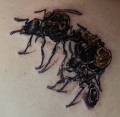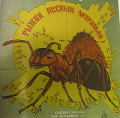"Bees die en masse from almond milk hype.
Camille Van Puymbroeck
Almond brand has been on the rise in recent years. More and more coffee shops are presenting it as a vegan alternative to cow's milk. Both vegans and people who do not drink "regular" milk are completely euphoric about this, but there is also less good news. The almond industry has the death of millions of bees on its conscience.
Before you order your cappuccino with almond milk as usual, you better think twice. Although the milk substitute is in principle vegan, that claim is coming under increasing pressure due to the massive bee mortality caused by the industry.
Monoculture
It is the British newspaper The Guardian who exposes the problem. Central Valley in the US state of California accounts for an impressive 80% of global almond production. The rows of almond trees seem to stretch almost infinitely through the valley. In itself not a problem, were it not for the monoculture to seriously disturb the natural balance in the region. Not only is other planting removed without mercy, but moreover the trees are regularly sprayed with pesticides, including the notorious glyphosate.
Pollination
Despite the highly advanced industrialization of almond cultivation, bees are still needed for pollination. Almond companies therefore conclude deals with independent beekeepers, who make (part of) their bee colony available for almond cultivation a few months a year. Although they get a decent amount for this in exchange, that money compensation can hardly match the damage that the beekeepers suffer from their colony as a result. Dennis Arp, a beekeeper who has been in the business for forty years, tells The Guardian how in the winter of 2018-2019 he lost no less than 12% of his bee population in a few months time. Across America, no fewer than 50 billion bees - a third of the total population - would have died in that period.
This mortality is partly due to a decrease in possible habitats and diseases, but according to biological beekeepers and nature organizations there is more going on. Due to the monoculture that the almond industry entails, among other things, the bees do not have a sufficiently balanced source of food. Moreover, diseases and pests spread much easier because bee colonies from all over America come together in Central Valley during the winter months. They take over diseases from each other and even if they survive, they spread them to the rest of the country. In addition, the insects are removed from their winter position two months earlier than usual, reducing their resistance.
Alternatives and measures
To curb bee mortality, various initiatives have recently been set up. For example, the Almond Board of California published a guide in which they recommend beekeepers to keep their bees in Central Valley for as short a time as possible. However, the amounts they receive from almond companies make it difficult for many of them to follow that directive. The Bee Where initiative, on the other hand, requires beekeepers to communicate the location of their colonies to the state, while farmers have to let them know when they plan to use pesticides. However, a sustainable solution is not. However, to ensure the bee number in the future too, it is necessary to create more biodiversity. The Bee Better program introduces all kinds of wild plants into the plantations in order to make the living environment of the bees more diverse and to limit the need for pesticides. Häagen Dasz was the first major player to join that program.
81-year-old Glenn Anderson prides himself on not using pesticides. His plantations not only house almond trees, but also other flora and insects to ensure the natural balance. His yield is therefore lower, but the American doesn't care. "The beekeeper I work with brings twenty of his weakest colonies to my plantation every spring so that they can regain their strength," he proudly tells The Guardian. According to Glenn, his approach is the only sustainable and tastes industrial almonds "to cardboard"."
From: https://www.msn.com/nl-be/nieuws/wetens ... ar-BBYTlLs
Bees die en masse from almond milk hype.
3 Beiträge
• Seite 1 von 1
Bees die en masse from almond milk hype.
- 2
Teleutotje
" Tell-oo-toat-yeh "
" I am who I am , I think ... "
" Tell-oo-toat-yeh "
" I am who I am , I think ... "
-

Teleutotje - Mitglied
- Beiträge: 1398
- Registriert: Freitag 1. August 2014, 18:01
- Wohnort: Nazareth, Belgium
- Bewertung: 1247
Re: Bees die en masse from almond milk hype.
Zum Thema sei hier ein weiteres mal auf den Film "More than Honey" verwiesen. Er gibt einen Einblick, wie weltweit unterschiedlich "geimkert" wird. Da wird rasch klar: Wenn Bienenstöcke massenhaft an den selben Ort - und dann wieder weg - transportiert werden, können sich nicht nur Krankheiten schneller übertragen. Die Transporte zu "Unzeiten" und in unterschiedlichen Klimazonen schwächen die Bienenvölker zusätzlich. Und die Pestizid- und Antibiotika-Einsätze tun dann den Rest.
- 2
„Doch vor allen Dingen:
Das worum du dich bemühst,
möge dir gelingen.“
Das worum du dich bemühst,
möge dir gelingen.“
-

Reber - Moderator
- Beiträge: 1772
- Registriert: Mittwoch 9. April 2014, 15:31
- Wohnort: Bern
- Bewertung: 3738
Re: Bees die en masse from almond milk hype.
Die amerikanische Wanderimkerei steht seit Jahrzehnten in der Kritik, wegen der Verbreitung von Parasiten und Krankheitserregern. Es gibt ja nicht "nur" die Varroa.
Aber was riskiert man nicht alles für einen schnellen $ !
Suum cuique kann ich da nur sagen, und die Honigbiene hat als fast weltweit verbreitete Art jedenfalls weit mehr Chancen zum Überleben als alle Wildbienen, um die sich ja nur wenige spinnerte Biologen und Naturschützer kümmern. Wenn eine Art nach der andern verschwindet, merkt das oft keiner.
Es ist schon arg traurig.
MfG,
Merkur
Aber was riskiert man nicht alles für einen schnellen $ !
Suum cuique kann ich da nur sagen, und die Honigbiene hat als fast weltweit verbreitete Art jedenfalls weit mehr Chancen zum Überleben als alle Wildbienen, um die sich ja nur wenige spinnerte Biologen und Naturschützer kümmern. Wenn eine Art nach der andern verschwindet, merkt das oft keiner.
Es ist schon arg traurig.
MfG,
Merkur
- 1
-

Merkur - Beirat
- Beiträge: 3666
- Registriert: Sonntag 6. April 2014, 07:52
- Wohnort: Reinheim
- Bewertung: 9934
3 Beiträge
• Seite 1 von 1
Zurück zu Spinnentiere, Insekten, Reptilien
Wer ist online?
Mitglieder in diesem Forum: 0 Mitglieder und 4 Gäste
